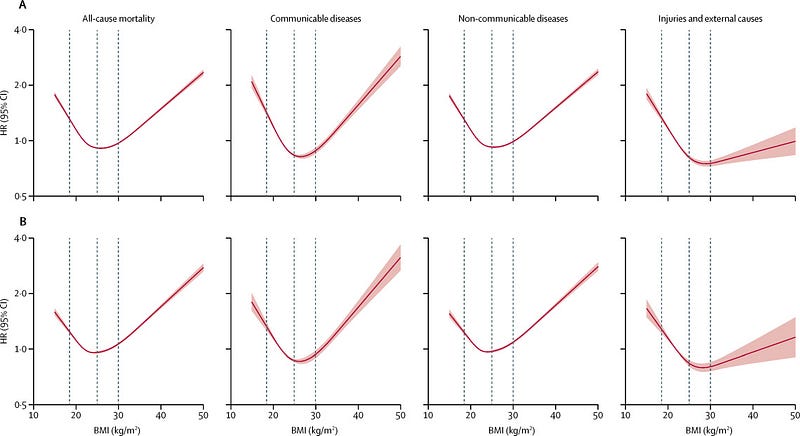Caloric Restriction and Longevity: A Closer Look at Overweight Benefits
Written on
Caloric Restriction and Its Impact on Lifespan
The concept of caloric restriction, whether through time-limited eating or other methods, is frequently promoted as a means to achieve a longer and healthier life. Furthermore, several anti-aging compounds seem to mimic certain aspects of caloric deprivation at a molecular level. Nevertheless, I hold some reservations regarding these claims.
A significant portion of the evidence stems from animal studies. While these studies provide valuable insights, it's essential to remember that lab mice cannot be directly compared to humans. Moreover, genetic differences among mice can lead to varying responses to caloric deficits; some may live longer while others do not. Additionally, mice are nocturnal creatures with a metabolism that is much faster than ours.
When we turn our attention to human studies, they often involve small sample sizes, focus on a limited number of biomarkers, and encounter challenges related to adherence, as few people enjoy the experience of hunger.
However, I must clarify my skepticism. Excess body fat is undoubtedly detrimental to long-term health. Reducing this excess through caloric restriction can lead to significant health improvements and potentially enhance lifespan.
Yet, if an individual already maintains a healthy body fat percentage, does further caloric restriction or fasting contribute to an extended lifespan? (For now, I will set aside other health claims that may distract us from this core question.)
Although the Body Mass Index (BMI) is not a flawless measure of weight-health relationships, it can serve as a reasonable proxy in large populations. Research indicates a U-shaped relationship between BMI and overall mortality, suggesting that both low and high BMI individuals face increased risks of premature death.

Questioning the Efficacy of Caloric Restriction
A recent review suggests that many studies on caloric restriction and longevity indicate that the benefits primarily arise when obese subjects attain a healthier weight. This challenges the idea that caloric restriction also enhances lifespan for those already at a healthy weight or body fat percentage.
This critique, while not new, has not gained sufficient attention. In many studies, the caloric-restricted group is compared to a control group that often has unrestricted access to food, typically a diet high in processed items. It's evident that such a lifestyle is not conducive to health or longevity.
You may recall the debates surrounding primate studies a few years back. One study involving rhesus monkeys demonstrated lifespan benefits from caloric restriction, while another did not. The review's author highlights that lifespan extension was only observed when the control group had unlimited food access. Conversely, when food intake for the control group was adjusted to match what would be a normal diet based on age and body weight, the lifespan benefits disappeared.
It's also important to note that in the study that failed to show lifespan extension, the control diet was nutritionally complete and sourced naturally. In contrast, the study that did indicate lifespan benefits provided a semi-purified diet, which typically consists of highly processed foods that lack nutritional adequacy. Beyond mere caloric intake, the composition of one's diet is crucial, but that discussion can wait for another time.
The review further explores the effectiveness of so-called caloric restriction mimetics—substances that replicate the molecular effects of caloric restriction. This includes compounds like resveratrol, rapamycin, NAD+, and metformin.
The findings are similar: in studies demonstrating positive effects from these compounds, weight loss is often a common outcome. This raises the question of whether the benefits attributed to these pharmacological interventions can be disentangled from the necessity of achieving and maintaining a healthy body weight.
In his conclusion, the author does not shy away from stating:
The ongoing failures and disappointing progress in aging research stem from the persistent failure to recognize caloric restriction for what it truly is: merely a method to prevent obesity.
He further adds:
While it's promising to view aging as a treatable condition, the rush to commercialize treatments for a universally affecting ailment may hinder real progress in aging research, which continues to focus on weight-loss compounds in rodents. Although the aging process may appear more adaptable than previously thought, it remains, in my view, as malleable as tungsten carbide.
This perspective, albeit blunt, serves as an essential counterbalance to the prevailing hype surrounding caloric restriction. It may inspire us to explore new avenues of thought.
Food for thought—no caloric restriction required.
Chapter 1: Diet and Caloric Restriction for Longevity
The following video discusses the implications of caloric restriction based on studies conducted on primates, exploring how diet impacts longevity.
Chapter 2: The CRONA Study: Insights on Aging and Health
This next video delves into the CRONA study, examining how caloric restriction influences aging and overall health.